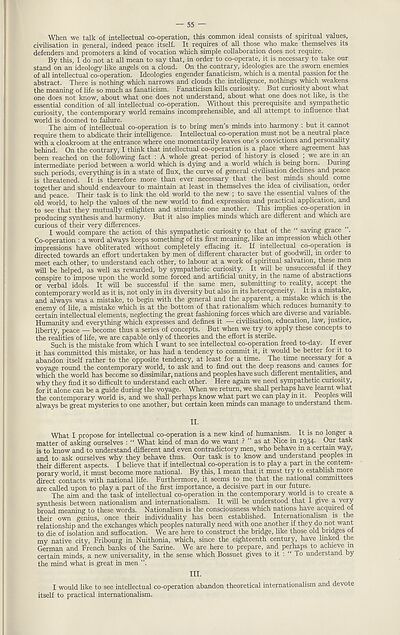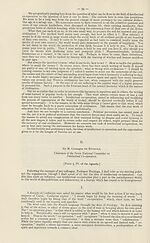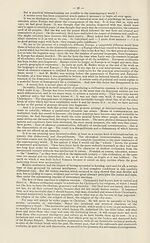International > Proceedings of the second General conference of national committees on intellectual co-operation, Paris, July 5th-9th, 1937
(57)
Download files
Complete book:
Individual page:
Thumbnail gallery: Grid view | List view

— 55 —
When we talk of intellectual co-operation, this common ideal consists of spiritual values,
civilisation in general, indeed peace itself. It requires of all those who make themselves its
defenders and promoters a kind of vocation which simple collaboration does not require.
By this, I do not at all mean to say that, in order to co-operate, it is necessary to take our
stand on an ideology like angels on a cloud. On the contrary, ideologies are the sworn enemies
of all intellectual co-operation. Ideologies engender fanaticism, which is a mental passion for the
abstract. There is nothing which narrows and clouds the intelligence, nothings which weakens
the meaning of life so much as fanaticism. Fanaticism kills curiosity. But curiosity about what
one does not know, about what one does not understand, about what one does not like, is the
essential condition of all intellectual co-operation. Without this prerequisite and sympathetic
curiosity, the contemporary world remains incomprehensible, and all attempt to influence that
world is doomed to failure. .
The aim of intellectual co-operation is to bring men’s minds into harmony : but it cannot
require them to abdicate their intelligence. Intellectual co-operation must not be a neutral place
with a cloakroom at the entrance where one momentarily leaves one s convictions and personality
behind. On the contrary, I think that intellectual co-operation is a place where agreement has
been reached on the following fact : A whole great period of history is closed ; we are in an
intermediate period between a world which is dying and a world which is being born. During
such periods, everything is in a state of flux, the curve of general civilisation declines and peace
is threatened. It is therefore more than ever necessary that the best minds should come
together and should endeavour to maintain at least in themselves the idea of civilisation, order
and peace. Their task is to link the old world to the new ; to save the essential values of the
old world, to help the values of the new world to find expression and practical application, and
to see that they mutually enlighten and stimulate one another. This implies co-operation in
producing synthesis and harmony. But it also implies minds which are different and which are
curious of their very differences. ... . ,,
I would compare the action of this sympathetic curiosity to that of the “ saving grace .
Co-operation : a word always keeps something of its first meaning, like an impression which other
impressions have obliterated without completely effacing it. If intellectual co-operation is
directed towards an effort undertaken by men of different character but of goodwill, in order to
meet each other, to understand each other, to labour at a work of spiritual salvation, these men
will be helped, as well as rewarded, by sympathetic curiosity. It will be unsuccessful if they
conspire to impose upon the world some forced and artificial unity, in the name of abstractions
or verbal idols. It will be successful if the same men, submitting to reality, accept the
contemporary world as it is, not only in its diversity but also in its heterogeneity. It is a mistake,
and always was a mistake, to begin with the general and the apparent, a mistake which is the
enemy of life, a mistake which is at the bottom of that rationalism which reduces humanity to
certain intellectual elements, neglecting the great fashioning forces which are diverse and variable.
Humanity and everything which expresses and defines it — civilisation, education, law, justice,
liberty, peace — become thus a series of concepts. But when we try to apply these concepts to
the realities of life, we are capable only of theories and the effort is sterile.
Such is the mistake from which I want to see intellectual co-operation freed to-day. If ever
it has committed this mistake, or has had a tendency to commit it, it would be better for it to
abandon itself rather to the opposite tendency, at least for a time. The time necessary for a
voyage round the contemporary world, to ask and to find out the deep reasons and causes for
which the world has become so dissimilar, nations and peoples have such different mentalities, and
why they find it so difficult to understand each other. Here again we need sympathetic curiosity,
for it alone can be a guide during the voyage. When we return, we shall perhaps have learnt what
the contemporary world is, and we shall perhaps know what part we can play in it. Peoples will
always be great mysteries to one another, but certain keen minds can manage to understand them.
II.
What I propose for intellectual co-operation is a new kind of humanism. It is no longer a
matter of asking ourselves : “ What kind of man do we want ? ” as at Nice in 1934. Our task
is to know and to understand different and even contradictory men, who behave in a certain way,
and to ask ourselves why they behave thus. Our task is to know and understand peoples m
their different aspects. I believe that if intellectual co-operation is to play a part in the contem¬
porary world, it must become more national. By this, I mean that it must try to establish more
direct contacts with national life. Furthermore, it seems to me that the national committees
are called upon to play a part of the first importance, a decisive part in our future.
The aim and the task of intellectual co-operation in the contemporary world is to create a
synthesis between nationalism and internationalism. It will be understood that I give a very
broad meaning to these words. Nationalism is the consciousness which nations have acquired of
their own genius, once their individuality has been established. Internationalism is the
relationship and the exchanges which peoples naturally need with one another if they do not want
to die of isolation and suffocation. We are here to construct the bridge, like those old bridges of
my native city, Fribourg in Nuithonia, which, since the eighteenth century, have linked the
German and French banks of the Sarine. We are here to prepare, and perhaps to achieve m
certain minds, a new universality, in the sense which Bossuet gives to it : “ To understand by
the mind what is great in men ”.
III.
I would like to see intellectual co-operation abandon theoretical internationalism and devote
itself to practical internationalism.
When we talk of intellectual co-operation, this common ideal consists of spiritual values,
civilisation in general, indeed peace itself. It requires of all those who make themselves its
defenders and promoters a kind of vocation which simple collaboration does not require.
By this, I do not at all mean to say that, in order to co-operate, it is necessary to take our
stand on an ideology like angels on a cloud. On the contrary, ideologies are the sworn enemies
of all intellectual co-operation. Ideologies engender fanaticism, which is a mental passion for the
abstract. There is nothing which narrows and clouds the intelligence, nothings which weakens
the meaning of life so much as fanaticism. Fanaticism kills curiosity. But curiosity about what
one does not know, about what one does not understand, about what one does not like, is the
essential condition of all intellectual co-operation. Without this prerequisite and sympathetic
curiosity, the contemporary world remains incomprehensible, and all attempt to influence that
world is doomed to failure. .
The aim of intellectual co-operation is to bring men’s minds into harmony : but it cannot
require them to abdicate their intelligence. Intellectual co-operation must not be a neutral place
with a cloakroom at the entrance where one momentarily leaves one s convictions and personality
behind. On the contrary, I think that intellectual co-operation is a place where agreement has
been reached on the following fact : A whole great period of history is closed ; we are in an
intermediate period between a world which is dying and a world which is being born. During
such periods, everything is in a state of flux, the curve of general civilisation declines and peace
is threatened. It is therefore more than ever necessary that the best minds should come
together and should endeavour to maintain at least in themselves the idea of civilisation, order
and peace. Their task is to link the old world to the new ; to save the essential values of the
old world, to help the values of the new world to find expression and practical application, and
to see that they mutually enlighten and stimulate one another. This implies co-operation in
producing synthesis and harmony. But it also implies minds which are different and which are
curious of their very differences. ... . ,,
I would compare the action of this sympathetic curiosity to that of the “ saving grace .
Co-operation : a word always keeps something of its first meaning, like an impression which other
impressions have obliterated without completely effacing it. If intellectual co-operation is
directed towards an effort undertaken by men of different character but of goodwill, in order to
meet each other, to understand each other, to labour at a work of spiritual salvation, these men
will be helped, as well as rewarded, by sympathetic curiosity. It will be unsuccessful if they
conspire to impose upon the world some forced and artificial unity, in the name of abstractions
or verbal idols. It will be successful if the same men, submitting to reality, accept the
contemporary world as it is, not only in its diversity but also in its heterogeneity. It is a mistake,
and always was a mistake, to begin with the general and the apparent, a mistake which is the
enemy of life, a mistake which is at the bottom of that rationalism which reduces humanity to
certain intellectual elements, neglecting the great fashioning forces which are diverse and variable.
Humanity and everything which expresses and defines it — civilisation, education, law, justice,
liberty, peace — become thus a series of concepts. But when we try to apply these concepts to
the realities of life, we are capable only of theories and the effort is sterile.
Such is the mistake from which I want to see intellectual co-operation freed to-day. If ever
it has committed this mistake, or has had a tendency to commit it, it would be better for it to
abandon itself rather to the opposite tendency, at least for a time. The time necessary for a
voyage round the contemporary world, to ask and to find out the deep reasons and causes for
which the world has become so dissimilar, nations and peoples have such different mentalities, and
why they find it so difficult to understand each other. Here again we need sympathetic curiosity,
for it alone can be a guide during the voyage. When we return, we shall perhaps have learnt what
the contemporary world is, and we shall perhaps know what part we can play in it. Peoples will
always be great mysteries to one another, but certain keen minds can manage to understand them.
II.
What I propose for intellectual co-operation is a new kind of humanism. It is no longer a
matter of asking ourselves : “ What kind of man do we want ? ” as at Nice in 1934. Our task
is to know and to understand different and even contradictory men, who behave in a certain way,
and to ask ourselves why they behave thus. Our task is to know and understand peoples m
their different aspects. I believe that if intellectual co-operation is to play a part in the contem¬
porary world, it must become more national. By this, I mean that it must try to establish more
direct contacts with national life. Furthermore, it seems to me that the national committees
are called upon to play a part of the first importance, a decisive part in our future.
The aim and the task of intellectual co-operation in the contemporary world is to create a
synthesis between nationalism and internationalism. It will be understood that I give a very
broad meaning to these words. Nationalism is the consciousness which nations have acquired of
their own genius, once their individuality has been established. Internationalism is the
relationship and the exchanges which peoples naturally need with one another if they do not want
to die of isolation and suffocation. We are here to construct the bridge, like those old bridges of
my native city, Fribourg in Nuithonia, which, since the eighteenth century, have linked the
German and French banks of the Sarine. We are here to prepare, and perhaps to achieve m
certain minds, a new universality, in the sense which Bossuet gives to it : “ To understand by
the mind what is great in men ”.
III.
I would like to see intellectual co-operation abandon theoretical internationalism and devote
itself to practical internationalism.
Set display mode to:
![]() Universal Viewer |
Universal Viewer | ![]() Mirador |
Large image | Transcription
Mirador |
Large image | Transcription
Images and transcriptions on this page, including medium image downloads, may be used under the Creative Commons Attribution 4.0 International Licence unless otherwise stated. ![]()
| League of Nations > International > Proceedings of the second General conference of national committees on intellectual co-operation, Paris, July 5th-9th, 1937 > (57) |
|---|
| Permanent URL | https://digital.nls.uk/195217916 |
|---|
| Shelfmark | LN.XII |
|---|
| Description | Over 1,200 documents from the non-political organs of the League of Nations that dealt with health, disarmament, economic and financial matters for the duration of the League (1919-1945). Also online are statistical bulletins, essential facts, and an overview of the League by the first Secretary General, Sir Eric Drummond. These items are part of the Official Publications collection at the National Library of Scotland. |
|---|---|
| Additional NLS resources: |
|

